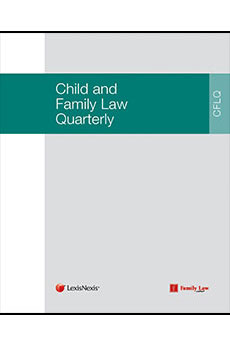Our articles are written by experts in their field and include barristers, solicitors, judges, mediators, academics and professionals from a range of related disciplines. Family Law provides a platform for debate for all the important topics, from divorce
and care proceedings to transparency and access to justice. If you would like to contribute please email
emma.reitano@lexisnexis.co.uk.
Sir Ernest Ryder addresses decision-making for children and the role of the justice system
© Copyright LexisNexis 2025. All rights reserved.
Sir Ernest Ryder, Senior President of Tribunals, spoke on the role of the justice system in decision-making for children at the 10th International Congress of the British Association for the Study and Prevention of Child Abuse and Neglect (BASPCAN), held at the University of Warwick on 9 April 2018.
Taking decision-making as his theme, Sir Ernest stressed the importance of judgments made every day in courts and tribunals – whether straightforward and non-contentious, or highly complex and contentious. Judicial decision-making, he said, is an exercise of state power, and must be the rule of law in action.
Article continues below...
Child and Family Law Quarterly
"The final professional word for the practitioner...
£80
Family Justice Reformed
Previously known as Reforming Family Justice: A...
£69.99
Decisions on family justice
Often, the most sensitive decisions a judge must make are those which arise within the family justice system, particularly those involving children. Since the publication of the Family Justice Review in 2011, the family justice system has been undergoing a systematic programme of reform in order to ensure more and better access to justice for children and their families.
This reform programme has resulted in the creation of a single Family Court and the implementation of the Family Justice Modernisation Programme, aimed at ensuring the family judiciary and HM Courts and Tribunals Service have the necessary structures, leadership and management skills to ensure the Family Court is able to operate effectively.
Improving the delivery of justice
Sir Ernest said the delivery of justice is changing
– the former adversarial approach ‘is challenged in the context of family justice with its more inquisitorial process, in which the focus must be on 'safeguarding children by securing their best interests’.
He concluded by stressing that to ensure these developments enhance how justice is delivered:
‘We will need to ensure that judges have the training, experience and materials to enable them to carry out their evolving roles effectively … the right training, experience and materials must be drawn from a multi-disciplinary, peer reviewed and validated research base. To obtain that we must both demonstrate leadership in identifying and putting in place what is necessary and acknowledge that we should draw on the skills and experience of others.’
Read the speech in full
here.







